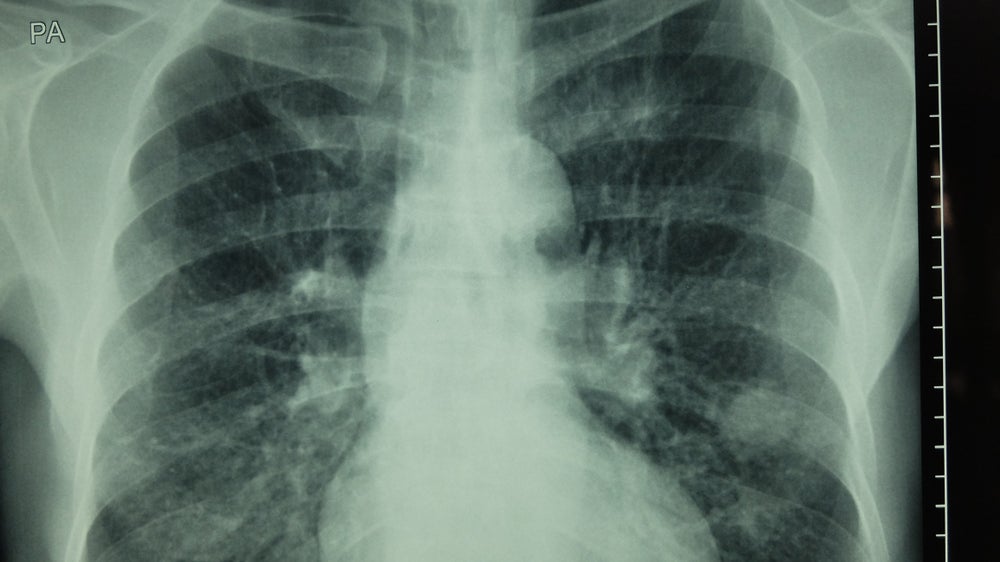
Lung cancer is the leading cause of cancer death around the world, with an estimated 2.2 million new cases and 1.8 million lung cancer-related deaths per year.
Non-small cell lung cancer (NSCLC) constitutes around 85% of lung cancer cases, with a further 15-20% of patients afflicted by epidermal growth factor receptor mutations (EGFRm).
Historically, platinum-based chemotherapies were the treatment of choice for patients with NSCLC.
With advances in biomarker testing, EGFRm-targeted therapy with tyrosine kinase inhibitors (TKIs) has become the recommended standard of care.
In February of this year, AstraZeneca’s Tagrisso received US Food and Drug Administration (FDA) approval in combination with platinum-based chemotherapy to treat locally advanced or metastatic EGFRm NSCLC, specifically EGFR exon 19 deletions or exon 21 L858R mutations.
The FDA approval was primarily based on the success of Tagrisso in the Phase III FLAURA2 trial (n=557).
See Also:
The trial compared Tagrisso monotherapy against Tagrisso and chemotherapy in the first line for NSCLC patients.
How well do you really know your competitors?
Access the most comprehensive Company Profiles on the market, powered by GlobalData. Save hours of research. Gain competitive edge.

Thank you!
Your download email will arrive shortly
Not ready to buy yet? Download a free sample
We are confident about the unique quality of our Company Profiles. However, we want you to make the most beneficial decision for your business, so we offer a free sample that you can download by submitting the below form
By GlobalDataThe trial demonstrated strong progression-free survival (PFS), which was significantly higher with the combination arm (hazard ratio [HR] 0.62; P<0.001).
After two years, the PFS was 57% and 41% for the combination and monotherapy arms, respectively.
Updates published in March 2024 have distinguished a favourable overall survival (OS) with the Tagrisso and chemotherapy arm over Tagrisso monotherapy (HR 0.75; 95% confidence interval [CI] 0.57-0.97).
Tagrisso was directly compared to AstraZeneca’s Iressa, the first EGFRm TKI approved for NSCLC, and Roche’s Tarceva for first-line treatment of metastatic disease in the Phase III FLAURA trial (n=556).
The results showed a clear benefit with Tagrisso over its competitor’s arm, as it resulted in an improved OS of 6.8 months (HR 0.80; P=0.046).
It also maintained a longer duration of treatment, with 28% of patients receiving Tagrisso at three years after trial initiation compared to 9% receiving Iressa or Tarceva.
In the Tagrisso arm, 42% of adverse events were grade 3 or higher, compared to 47% in the comparator arms.
Tagrisso’s advantage over its competitors in the US is emphasised by its category 1 recommendation by the National Comprehensive Cancer Network (NCCN) for treating NSCLC with EGFR exon 19 deletions or exon 21 L858R mutations.
Leading data and analytics company GlobalData’s analyst consensus forecast predicts that Tagrisso’s total sales will reach $7.6bn globally by 2030.
With clear benefits over first- and second-generation EGFR TKIs, Tagrisso is positioned to have strong sales in NSCLC.
The value of Tagrisso may also further expand to other indications, as it is currently being appraised in a basket Phase II MATCH trial by the National Cancer Institute.
The objective of the trial is to observe if treating cancers via specific genetic biomarkers improves treatment outcomes compared to following broad treatment guidelines that are often based on histology.
If the results of the FLAURA2 trial demonstrate sustained improvements across PFS and OS, and the NCI trial can show this effect is consistent across indications, Tagrisso has the potential to become the most prominent EGFRm TKI in the cancer treatment landscape.









Related Company Profiles
AstraZeneca Plc
Roche Diagnostics International Ltd